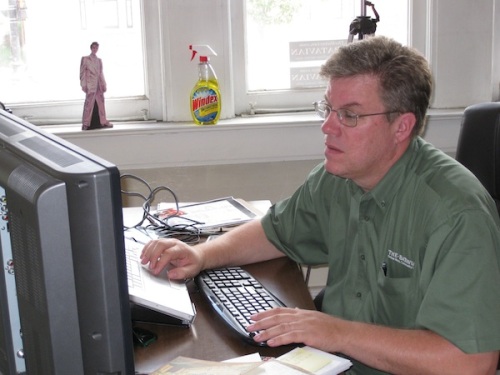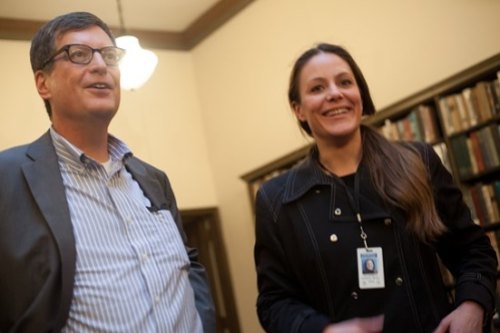
This article appeared earlier at the Nieman Journalism Lab. I’ll be reading from “The Wired City” this Saturday, July 13, at 11 a.m. at Present Tense Books, located in Batavia at 101 Washington Ave.
For those of a certain age, perusing the ads posted at The Batavian, a for-profit news site in Batavia, N.Y., can seem a lot like flipping through the pages of a weekly community newspaper a generation or two ago.
Which is to say there are a lot of ads — more than 140, every one on the home page, a practice that publisher Howard Owens believes is more effective than rotating them in and out. There are ads for funeral homes and pizza shops. For accountants and tattoo parlors. For auto-repair centers and ice-cream stands. For bars and baseball (the minor-league Batavia Muckdogs).
The success of The Batavian matters to the future of local journalism. In my book “The Wired City: Reimagining Journalism and Civic Life in the Post-Newspaper Age,” I devote most of my attention to the New Haven Independent, a nonprofit site that subsists on grant money, donations and sponsorships. At this early stage of online news, nonprofits like the Independent are often able to raise more money more quickly than for-profits. But not every community can support a nonprofit. Thus it is vital for the future of news that entrepreneurs like Owens figure out the for-profit side — which is why I also devote a fair amount of space in “The Wired City” to what’s going on in Batavia.
Owens launched The Batavian in 2008 as a demonstration project for GateHouse Media, where he was the director of digital publishing. When his position was eliminated in early 2009, he asked GateHouse if he could take the fledgling site with him. He was granted his wish.
The Batavian is free and covers not just the city of Batavia (population 15,000) but surrounding Genesee County (60,000) as well. It receives about 80,000 unique visitors per month, according to Quantcast. That’s roughly the same as the site’s newspaper competition, The Daily News, also based in Batavia. (Web analytics are imprecise, and Owens says his internal count, provided by Google Analytics, shows about 118,000 uniques per month.) Of course, The Daily, as the locals call it, depends mainly on print distribution. On the other hand, The Batavian covers just one county to The Daily’s three, making Owens’ online reach all the more impressive.
The Batavian’s 12-month projected revenues are currently about $180,000 a year — enough to provide Owens and his wife, Billie Owens, the site’s part-time editor, with a comfortable living, and to employ a part-time sales and marketing coordinator. Unlike AOL, with its struggling network of Patch sites, The Batavian is independent, and Owens aims to keep it that way. As the Authentically Local project, of which The Batavian is a part, puts it: “Local doesn’t scale.”

If a nonprofit like the New Haven Independent can raise more money than a for-profit (indeed, Independent founder and editor Paul Bass chose the nonprofit route in 2005 because he realized he couldn’t support himself with a for-profit), there are nevertheless certain advantages to for-profit online journalism. Let me outline three of the more obvious.
• Anyone can start a for-profit news site. The nonprofit route requires approval from the IRS and support from local foundations. In many cases, neither may be forthcoming — and as I recently wrote, the IRS has all but halted approval of 501(c)(3) status for nonprofit news sites, which they depend on so that donors can make tax-free contributions. By contrast, all it takes to launch a for-profit site is talent, experience and a willingness to work hard. That’s no guarantee of success, but the opportunity is there for all.
• Local ads enhance the vibrancy of a site. Owens likes to say that advertising is content. The ads at The Batavian give you a good feel for Genesee County — and provide a context for Owens’ coverage of everything from court news to traffic accidents, from school events to development proposals. Advertising and news work together to provide a well-rounded picture of the community. Yet you won’t see ads at a nonprofit site like the Independent, save for a few image-building “sponsorships” from local institutions such as college and hospitals.
• For-profit sites enjoy the full protection of the First Amendment. Like public radio and television stations, but unlike the vast majority of newspapers, nonprofit news sites are legally prohibited from endorsing candidates for public office. “Editorial endorsements — or the denial of them — are among the most powerful tools that newspapers have for holding political figures to account,” write the media scholar Robert McChesney and the journalist John Nichols in their 2010 book “The Death and Life of American Journalism: The Media Revolution that Will Begin the World Again.” The Batavian hasn’t actually endorsed any candidates, but at least it’s not legally prohibited from doing so — and Owens takes strong stands on other local issues without having to worry about the federal government swooping in and threatening his livelihood.
***
When I visited Batavia in 2009, I rode along with Owens as he made sales calls and covered stories in Genesee County. It seemed like a hard slog. At one point, as we were driving through the tiny farm town of Stafford, he gestured to a well-manicured golf course. “If you find out that I’ve joined the Stafford Country Club,” he said, “then I’ve been successful.” Two years later, I asked him about the status of his country club aspirations. He laughed. “I’d love to join the Stafford Country Club and have time to enjoy the privileges thereof,” he said, “but we’re probably years away from doing that.”
Yet The Batavian keeps growing. Last week the site announced a new real-estate ad partnership. Recently Owens told me he now spends virtually none of his time on ad sales, having offloaded that task to his part-time employee. The Owenses are able to devote the bulk of their time to journalism — something that was not the case when I was researching “The Wired City.”
Owens likes to remind people that we’re at the very beginning of online news as a business, and that what appears not to add up economically today may look quite different a few years from now. As Owens asked in a provocative blog post four years ago: “If it took newspapers more than 100 years to build the business and content models that we all now cherish, why do we expect a fully formed online model to emerge in just 10 years?”
Photos (cc) 2009 by Dan Kennedy.

